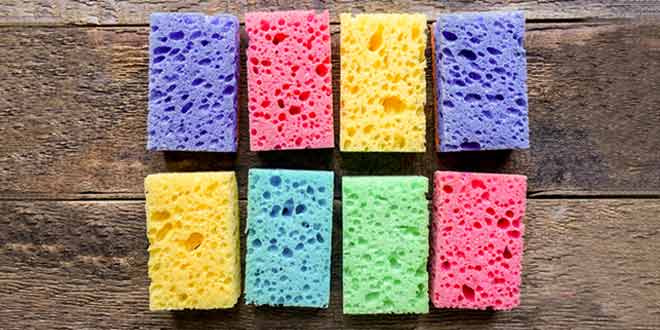
9 Amazing Things You can Do with a Sponge
This ordinary kitchen item is far more versatile than you may think. Sponges can be used in almost every aspect of daily life–from cleaning and deodorizing to beauty hacks and crafts.
Surprising Sponge Uses that You Didn’t Know
Here are 9 simple, but surprising sponge uses that are guaranteed to make your life much easier.
1. Prevent Soap Waste-age and Messes
Placing a sponge at the bottom of your soap dish, or even using a sponge in place of a soap dish will help you avoid the gloppy messes that tend to form at the bottom of soap dishes after several uses. The sponge will absorb moisture from the soap, preventing it from dissolving.
2. Make Miniature Ice Packs
To do this, simply take a clean sponge, soak it in water, place the sponge in a plastic bag and put it in the freezer. You can customize the size of your ice-pack by cutting the sponge into smaller pieces.
The advantage of this technique is that, once the ice begins to melt, the water is absorbed by the sponge and so does not create a mess.
3. Keep Refrigerated Vegetables Fresh
Line the bottom of the vegetable drawer in your refrigerator with sponges and wring out or replace the sponges whenever they seem wet. The sponges will absorb excess moisture, helping your vegetables to stay at their peak.
4. Remove Pet (or human) Hair and Lint
A slightly damp sponge can be used to easily wipe away hair from upholstery, carpeting and even clothing. The hairs will cling to the water in the sponge. Damp sponges can also remove fuzz from old woolen sweaters and shawls.
5. Protect Furniture and Breakables
Wood and metal tables are easily scuffed by decorative items such as vases or frames. To protect these surfaces, simply glue small squares of soft sponge to the bottoms of these decorative items. For flower vases, the sponge provides the added advantage of absorbing moisture and preventing the formation of water stains on wood furniture.
When storing items such as ceramic bowls or figurines, you can place pieces of sponge near sharp corners or fragile parts that could easily damage.
6. Nail Care with a Sponge
Sponges provide an easy, reusable and more effective alternative to cotton wool or tissue paper for removing nail polish. Simply stuff sponge in a small mason jar and fill it with acetone. Remove nail polish by dipping your finger into the sponge and twisting. Remember to seal the jar when it’s not in use and to replace/clean the sponge and add more nail polish remover when in becomes too dirty.
Sponges can also be used to make pedicures less messy. Place cut pieces of sponge between your toes to avoid smudging your nail polish.
7. Seal a Drafty Window
Stuff sponges into leaky cracks around windows or doors to prevent cold air from the air conditioner from escaping the room.
8. Blister-proof Shoes and Handles
Wrapping soft sponges around the handles of rakes, shovels, and brooms helps create a firm, comfortable grip and will save your hands from developing blisters. Small circular pieces of soft sponge can be placed in the space between your heel and the back of your shoe will prevent the development of heel blisters.
You can secure the sponge in its place using a hot glue gun, or rubber bands in the case of circular handles.
9. Deodorize Your Fridge or Icebox with a Sponge
Sprinkle baking soda on a damp sponge and place the sponge in the corner of your fridge or icebox. The baking soda absorbs and neutralizes sour acidic odors from foods, keeping your fridge smelling fresh and clean. Make sure to wash and replace the sponge daily.

